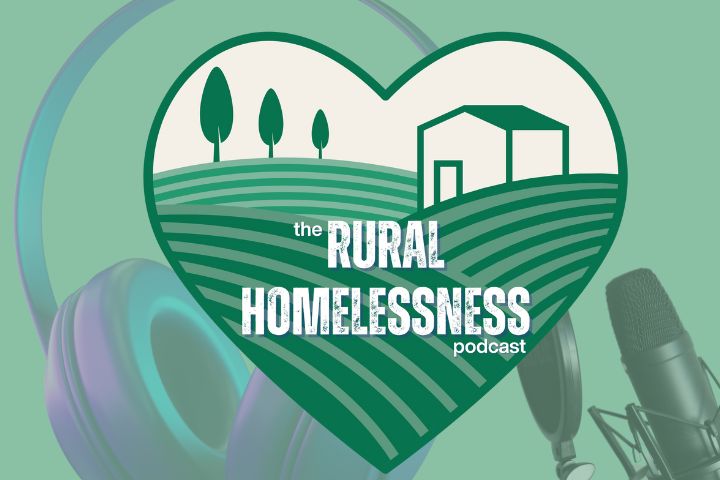➤
Back to News
17 November 2024
How Modular Housing can Address Rural Homelessness
In this episode of the Rural Homelessness Podcast, Matt McChlery discusses how modular housing can help address rural homelessness. He is joined by Lewis Herbert, the manager of Allia Future Homes, and Daniel Renn, the Allia Future Homes Housing Development Lead. They explain that modular housing involves constructing sections of a building in a factory and then transporting them to the site for assembly. Modular housing offers benefits such as speed, cost-effectiveness, quality control, sustainability, and flexibility. It can be used in various sectors, including housing for the homeless. The challenges of modular housing include overcoming the stigma and lack of awareness, navigating building codes and regulations, and transportation logistics. The hope for the future of modular housing is mainstream acceptance, supportive policies, innovation, and wider use to address the housing shortage and homelessness crisis.
Transcript
Introduction
This is the Rural Homelessness Podcast, where we discuss the important issues around rural homelessness, hear from those affected by it, and offer some solutions. Brought to you by the award-winning homelessness charity, The Ferry Project. Welcome to the Rural Homelessness Podcast.
Matt McChlery (Host)
Hello and welcome to this episode of the Rural Homelessness Podcast. I'm your host, Matt McChlery. Thanks so much for clicking over and joining us today. Now on today's show we're going to be talking about how modular housing can help to address rural homelessness. And I'm joined on the show by Lewis Herbert, who is the manager of Allia Future Homes, and also Daniel Renn, who is the Allia Future Homes Housing Development Lead. Let's welcome them to the show.
Hello, Lewis. Welcome to the Rural Homelessness Podcast.
Lewis
Hi.
Matt
And hi, Daniel. Thanks for joining us today.
Daniel
Thanks. Good to be here.
Matt
So today we are speaking about modular housing and how that fits in with rural homelessness. Of course, this is something you guys live and breathe. So before we launch deeper into the questions, let's start off by explaining a little bit more about Allia Future Homes and what they do. So Lewis, can you tell us more about Allia?
Lewis
Allia was set up by my boss, Martin Clark, and a guy called Tim Jones. It's based in Cambridgeshire. It runs business centres for small businesses and charities. It also raises funds. So it has a finance arm and that basically works the money markets, particularly for housing associations, but also creates bonds for charities, and has helped quite a lot of charities locally. It recycles the surplus, it doesn't have shareholders and it's committed to helping social enterprises like the Ferry Project tackling inequality, and a whole range of issues: developing managers of charities, Climate Change, Green Energy. It's a forward thinking company.
Matt
And how does Allia Future Homes fit into this sort of umbrella organisation?
Lewis
Martin Clark's a brave soul and he believed in creating supported modular home communities. He was on the lookout for land from about 2018, before creating the first community assisted by Christ the Redeemer Church on Newmarket Road in Cambridge, where he was able to work with them as the landowner and with Jimmy's Cambridge, the version of Ferry Project that works in Cambridge for homeless people and former rough sleepers. That effectively created the first community.
Along with my able partner, Daniel Renn, we're now a team of two, supported by Allia. Martin then created with Keith Smith and the Ferry Project a really amazing scheme in Jubilee Place, which is six homes which enable people who were previously rough sleeping or homeless into what we would call transitional accommodation.
Then we'd hope that they move on to permanent rental homes. Effectively what we're trying to do is help people through a period of recovery who can then rebuild their lives and be independent again.
Matt
Really good. And just so our listeners are aware, we've already started talking about modular housing. Could you explain, Daniel, what is modular housing and how is it different to regular housing?
Daniel
Sure. It's actually pretty simple. Modular housing involves constructing sections or modules of a building in a factory environment and then transporting those modules to the site for assembly, whereas traditional homes are usually entirely built on site.
Matt
Would people kind of picture this as being a caravan home or is that something slightly different?
Daniel
It's different. It's higher quality. You can imagine it as like playing Lego for adults, but high quality Lego. So you have many, many options. You can build on the ground. You can have new stories on existing buildings. And most of the time you don't even spot from the outside that it's modular once you build a facade on or a roof on top. So it's quite different to caravan housing.
Matt
Okay. And because it's mostly built in a factory and not on site, are you able to get planning permission for things like that, or mortgages? How does that work?
Daniel
Yeah, you're able to get those. But it's not easy. The modular market is quite new, I would say, at least for certifications or getting insurances or financing on those homes. But there are ways to do it. There is a certification called BOPAS, and that certification tells you these homes are built to a quality which will last at least 60 years. Therefore you'll get a mortgage on that, for example.
Matt
Right. That's interesting. We'll dig into modular housing a little bit more later on. Lewis, let's come back to you. We've got this modular housing model that you guys are championing, but that obviously highlights that there are problems with the regular housing method. What are some of the problems or challenges that you see are facing the current housing situation in Britain?
Lewis
Well, we're in a housing emergency. We haven't been building enough affordable rent homes for most of my lifetime and I'm 69. So since the mid 70s, there's been a failure to build affordable rent homes. There's been a lack of government support for council homes and there is just a dearth of housing and that applies in rural areas, it applies in Cambridge and London. We've got a national crisis.
I mean the figures are appalling. We've got 120,000 households currently in temporary accommodation, like a family of five that's got two rooms in a guest house which isn't even in their home community. That's over 300,000 people in often substandard temporary homes.
And we've got wider challenges. We've got 130,000 young people who are either homeless or they're at risk of being homeless. They're sofa surfing. They've not got a home. And as people listening to this will realise, having a home is actually a main foundation before you can actually feel like you're a human being. Rough sleeping rose 28% last year and there's been a 70% rise in the number of massively vulnerable women rough sleepers. So I think the problem is we've got an emergency that's been stoked up, particularly over the last 14 years, where the only focus seems to have been on people who can afford to buy a home.
It will be 20 years before we get on top of this problem. And so that's why we've got to focus on the opportunity of efficient modular homes, low energy, really well designed, because we will continue to need what we call not temporary but transitional homes for at least two decades and then people can move on into better homes.
We need to see a government who is actually going to invest and ensure that we start that 20 year building program now. People are in dire straits, children are not getting the right kind of environment, if they're being moved from one piece of temporary accommodation to another.
Matt
And that's one of the possible broader national solutions to the problem. But what are some other ways that we can try and solve or address these problems and challenges you've just highlighted?
Lewis
There definitely needs to be a targeting of support for homeless charities like the Ferry Project, like the Light Project in Peterborough, Jimmy's in Cambridge. We need the government to target help at the front line.
We also need the government to do what's called sorting out the local housing allowance. Rents vary remarkably between Chatteris and Wisbech, Peterborough and Cambridge. The rent levels just need to then be taken into account in the benefits that people get. So if somebody's out of work or they need to get support, that should include the full cost of being able to rent somewhere.
There's a whole package of changes needed and it's not cheap, but we're talking about people who are living in poverty. We're talking about people who are forced to sleep in tents and sleep rough, the very people that the Ferry Project tries to help. We've got to help the people and they've got to be supported.
Matt
Thank you. Daniel, what are some of the benefits of this modular housing model? How can this help be part of this solution to the problem Lewis has just highlighted?
Daniel
There are several benefits. I’ll try to break it down to the biggest ones.
Speed. The construction is faster due to simultaneous side work and module building in a factory. The cost effectiveness through reduced waste and labour costs. The quality I mentioned earlier, it's easier to control the quality in a factory to ensure high standards. Then the environmental impact; it's more sustainable with less material waste and the ability to include energy efficient features is great.
And then my favourite benefit, the flexibility. It's easily customizable to meet specific needs and suitable for various types of buildings. And like I mentioned earlier, it's basically just like playing Lego.
Matt
We were saying that some of the problems are that the government isn't building affordable housing, which really prices a lot of people out of the market and therefore they can't afford to buy a home. Then they have to rent or then or whatever situation they find themselves in. So speaking about affordability then, how affordable are modular homes in comparison to regular brick and mortar houses?
Daniel
It's really hard to compare. It's dependent on the project you have at hand, the scale of it. Just like the modular builder you choose, for example. There's not only one modular manufacturer out there. There are several, and then they are building to different standards or they have different topics they focus on. The one modular builder is really sustainable, whereas the other one is really affordable, but it's not super environmentally friendly. It's coming down to what manufacturing you want for your project. That's a part of what Allia Future Homes is doing. We are there to offer expertise to our clients and tell them, “Hey, that might be a good manufacturer for you.”
Just comparing modular with traditional is not a one-to-one comparison. Modular can serve, for example, different sites. If you have a temporary site for 10 years, modular can serve that site and then move the homes somewhere else. Whereas traditional can't do that. So it's hard to compare.
From my experience, which is working with a modular manufacturer in Germany, we are cheaper, especially for the running costs, so there are modular schemes for homeless people, which have energy bills of less than five pounds per week. And if we look at our energy bill, I'm pretty certain they are higher. So it's hard to compare, but in the end, I'm pretty sure that modular homes can be the better solution depending on the project you want to have.
Matt
So are Allia Future Homes primarily focused on housing the homeless or is that just one of the many strands that you work on?
Daniel
Our focus is on homelessness.
Matt
Okay. For the benefit of our listeners as well, your focus is homelessness and helping people to escape the cycle of poverty, which is fantastic. But when we’re talking about modular homes in general, are modular homes just things to help homeless people or can anybody look at investing in a modular home as an alternative to a normal house?
Daniel
Anyone can do that. Modular serves pretty much all the sectors. Whatever is scalable is good for modular. Offices, schools, homeless communities, or if you think about tiny homes, which is big in Eastern Europe right now, a lot of people buy themselves a tiny home and put it somewhere next to the woods, for example. That's modular as well. So modular is just a big word for construction which happens in a factory environment first and then gets on site.
It can be residential homes where you have two semi-detached houses or an office building with 500 offices in. So it serves pretty much every sector. But we think that modular is a great solution for these supported homeless communities because it's scalable, it's easy, it's fast, it's cost effective. You can serve many different sites. And that's why we found that we want to work with modular homes for creating these communities.
Matt
That's great. Because it's not a traditional building method really, and it's still fairly new in the UK, what are some of the challenges you face when trying to use or set up or spread the idea of modular housing in the UK and then in the housing sector? What challenges do you face there?
Daniel
I think the biggest challenge right now is the perception of the modular market due to the latest failure of big players like BT Passive or Ilke Homes and overcoming that stigma and lack of awareness about modular homes.
For us it’s like a teaching mission that we try to fulfil through our showcase projects and show the people it's good. If you do it well, it's gonna be a good solution for that project. But there are other challenges like navigating building codes, regulations, financing, insurances, which are not adapted to the modular method yet. I'm hopeful about the future.
And then simple things like transporting the homes to the site. If you're, for example, in a really dense city and as mentioned, these homes are already finished, so you need to find the right street to get the homes there.
There are different challenges, but the biggest one is just the education for people about the modular market and that it's a great solution.
Matt
So where can people educate themselves about modular housing?
Daniel
Listening to the podcast here.
Matt
That's a brilliant answer, thank you Daniel. That's wonderful. Lewis, coming back to you, how did you come to be involved with the Ferry Project?
Lewis
My first involvement was I was the first Cambridgeshire Recycling Officer. That started a bit before Keith, actually, it started 34 years ago, but I was aware around the year 2000 of what Keith was doing with the Ferry Project because he was really strong on reuse and all of the benefits that gives of creating interesting work for people who are recovering from problems by recycling furniture for people who really need it. So that was my involvement. From about 2000 to about 2010 I was involved on and off in different ways.
Meanwhile, Martin Clark, our illustrious boss, had been working with Keith on the potential to have a community. So Martin set up the first one and it was finished in 2020 in Cambridge and he was immediately talking to Keith along with the amazing Rebecca Howard, who helped the whole project, who was on the lookout for a site. We worked with Keith, we worked with an outfit, Places for People. They had a small piece of land. As Daniel said, there are a lot of advantages of modular and one of them is to make use of sites like Jubilee Place. So Allia got its hard hat on, its steel cap boots, and got to work helping Keith with new meaning.
Another lovely social enterprise based in Waterbeach made these homes, which as Daniel said last at least 60 years, and quite a lot of work was put in and six homes and a new community was created and that was opened two years ago.
Matt
How has the Ferry Project used modular housing effectively in this Jubilee place that you've helped them to establish?
Lewis
These communities we are passionate about, and we're currently working on one of 24 homes in Chelmsford. The most important thing is that there's an underestimated power of people who've got a shared life experience living together. So in addition to the direct support from the Ferry Project, this community of 25 square metre homes, they're easy for people who've been in difficult times, who may have been in more like hostel accommodation, to call their own. So a nice living area, decent kitchen facilities, shower, washing machine and a quiet bedroom at the back. It gives people the space to recover. So we call them move-on accommodation, transitional. They will have already made some progress, maybe at Octavia View, and this is in a way a reward for the fact that they're making progress. It's a halfway house before then moving on into places of their own, and then freeing up a place for somebody else who needs it.
Matt
And it's also helping them to adapt with those extra skills and things that when you're in the more supported environment you might have had a lot of help with, but now there's less of that support.
Lewis
Yeah. I think what happens there is that housing is often the last thing that people lose. For various reasons, their lives hit the buffers. They may have then suffered addiction problems, probably after something's gone wrong. So housing is often the last thing they lose and this lets people rebuild their self respect, they rebuild relationships with their families, with their friends. They're then in a position just to reboot, but they do need time and space. The homes are actually designed to be part of a community with a veranda that opens out to their neighbours. It is social, but they can shut the door and have peace and quiet. And they don't get that if you're in shared accommodation.
Matt
Thank you, Lewis. How can modular housing help those who are experiencing rural homelessness in particular? Obviously, the focus of our podcast is more specifically on rural homelessness because the Ferry Project is located in such a rural area. So how can modular housing help people in the rural situation?
Lewis
We'll take whatever sites we can. Often we're looking at larger towns and cities than Wisbech, but it's sometimes forgotten just exactly how difficult the homeless crisis is. They would tend to be better located within an existing settlement rather than outside, although Emmaus does a very good job around the country with rural-based communities. So I think it needs to be a site where people have got a shop nearby, they've got a bus service, they feel part of a community. It's often good if it's part of a church, so that's why we focus on generous churches who've got a spare piece of land. It's just as big a challenge.
And I think we've got a hidden homelessness crisis in rural areas. We've sometimes got councils that don't do as much as they need to, and they often have poor information. Councils are only really obliged to help people who've got children, households with children, and single people get badly neglected. Rough sleeping is only the edge of a huge iceberg with a lot of people that might be just finding a bed for the night. The worst part of it is if they end up having to sleep rough. And in winter, some of them die because the temperature is just so bad and their living conditions are so appalling that their health deteriorates. That's why we believe that supported communities have got just as big a part to play in smaller towns right across England and Wales and Scotland.
Matt
Daniel, have you got anything to add to that?
Daniel
Yeah, a couple of points. Lewis covered most of it very well, but I think there are some benefits which not only apply to the rural part, but which are just a big benefit from people experiencing homelessness everywhere. The biggest one is the rapid deployment. So we can build so much faster than traditional homes. Those people who are sleeping rough every single night, they don't have any time to wait. And so you want to provide them a roof over their head as soon as possible. And with that quick construction process, you also provide timely housing, which is essential.
Same with the affordability I mentioned earlier. Not only is it a cost-effective building method, which makes housing more affordable, but also by building it more sustainably, it reduces the utility costs in the end for the residents and, sure they have some support from the government, but every penny they can save is a valuable penny.
And also the scalability, so you can scale it for individual or community needs and the adaptability, so it's suitable for various rural landscapes and requirements and we can use sites which others can't build on. So yeah, there are so many benefits to that.
Matt
Yeah, there really are. And so what are your hopes for the future of modular housing? Daniel, we'll start with you and then we'll come to Lewis.
Daniel
Okay. I think my biggest hope is the mainstream acceptance and the recognition of modular housing for its quality and efficiency. Then I'm also looking forward to more supportive policies and more regulations that facilitate modular construction in general.
I'm hopeful about the continued innovation in that sector, about other construction techniques and materials, and also the promotion of green technologies and energy efficient design. Modular is already very good at that, but I'm pretty sure there will be more innovation, especially in that sector.
And of course, the wider use of modular housing to address the housing shortage and get people off the street as soon as possible.
Matt
Thank you. Lewis, how about you? What are your hopes for the future?
Lewis
We want to hear from people who might be listening to this and who are prompted to help the Ferry Project or other homeless charities.
Allia Future of Homes fills a gap because there is very little support, as Keith Smith knows and the team at Ferry Project know. You're living on a shoestring budget often. So we're looking for sites and we'd be really keen if a site can be found in Wisbech to help the Ferry Project build its second community.
We're looking for the government to help us because this is a tragedy, the lives that are being damaged. So yeah, we're here to work with people in towns and cities across the country and rural areas away from there. If people think there's a need and they can work with an organisation. So we do need a homeless charity that's at the centre who will effectively provide that ongoing support and run the homes that we're very happy to help build. And we just know that there's a gap there and it's a tragedy, but it's one that there's practical solutions for.
And these smaller homes, particularly for people who are getting used to living on their own and reestablishing lives, really fit the bill.
Matt
Thanks, Lewis. And for the benefit of our listeners, we will be putting a link to the Allia Future Home's website in our show notes of this episode, so if you want to click over there to find out more about them or get in contact with Lewis or Daniel, you can do that quite easily by just scrolling down to the bottom of this podcast, wherever you're listening, and you should find the show notes there and the link to their site.
Well, that just leaves me to say Lewis Herbert and Daniel Renn, thank you so much for joining us on this episode of the Rural Homelessness Podcast. Thank you for joining me.
Lewis
Thank you, Matt.
Daniel
Thank you for inviting us.
Matt
And thank you as well for listening to this episode. Don't forget that the Rural Homelessness Podcast comes out twice a month on the 1st and the 15th, so we'll be back really soon with another episode where we'll be discussing rural homelessness. We look forward to the pleasure of your company then. Goodbye.
Outro
Thank you for listening to the Rural Homelessness Podcast brought to you by The Ferry Project. Visit our website on www.ferryproject.org.uk.






